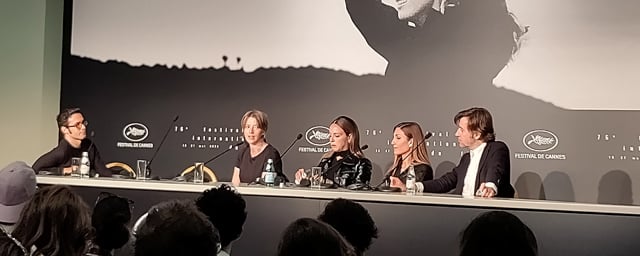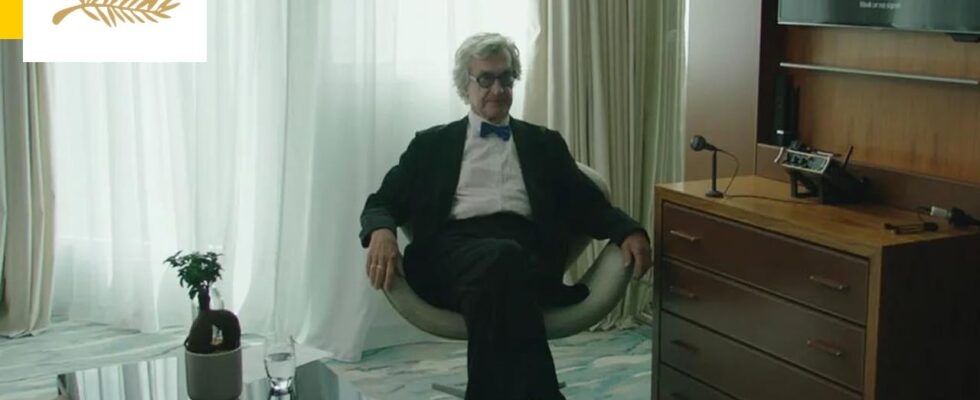Presented as part of the Cannes Classics 2023 selection, the documentary “Chambre 999” by Lubna Playoust follows on from “Chambre 666” by Wim Wenders. With new faces, and new answers.
In 1982, during the Cannes Film Festival, Wim Wenders made Room 666. This little-known documentary was based on a very structured device: a unique room (the room of a large hotel in Cannes), a fixed camera, an interviewee and a few minutes to answer to a question “Is cinema a language in the process of being lost, an art that is going to die?”.
Jean-Luc Godard, Werner Herzog, Michelangelo Antonioni or a young Steven Spielberg, among others, were among the sixteen filmmakers confronted with this reflection on their art while the emergence of home-entertainment questioned the future of cinema in theaters. (see an extract on INA.fr)
It’s my first feature film and I think that starting my work by asking the filmmakers I admire what the future of cinema is is a starting point.
Forty years later, for her first feature film, Lubna Playoust uses the same approach and the same device with Chambre 999, and confronts thirty filmmakers invited to the 2022 Cannes Film Festival with the same question while the 7th Art now has to deal with streaming platforms, the omnipresence of images, social networks and a digital world saturated with content.
“I wonder if we are still really innovating today, in language and in form?”, she explains in the press kit. “I knew that one day it would be necessary to reinstall the device and ask again the question posed by Wim Wenders. And then there was a kind of momentum for Cannes 2022. We kept hearing about the death of cinema. The film had been shot exactly 40 years earlier. And to add even more meaning, it was shot the year I was born. As soon as I told the idea to Rosalie Varda, the film’s producer, and mk2 and the Cannes festival gave their agreement, we organized the shooting in two weeks. It was like an alignment, a no-brainer, now was the time to do it.”
The cinema does not stop dying and that is the meaning of its life
“Is cinema a language in the process of being lost, an art that is going to die?” Faced with this question, the answers are fascinating, sometimes artistic, sometimes economic, sometimes philosophical (“Cinema keeps dying and that’s the meaning of its life” launches Arnaud Desplechin). Wim Wenderswho lends himself to the exercise and appears rather pessimistic about the future of his art, recalls that cinema was born from a fairground attraction and that he returns there, even if the fair is now “virtual, random, arbitrary and anonymous”.
Audrey Diwan wonders about narration in a world of increasingly short and immediate satisfaction. Alice Winocour on standardization. Ruben Ostlünd, President of the Jury at Cannes this year, agrees, expressing his concern about the concentration of means of distribution through a metaphor comparing platform algorithms to all-inclusive hotels where everything ends up have the same taste while persuading the user of the quality of the whole.
There are also the optimists, like David Cronenberg (“I don’t fear for the future of cinema, even if it will be a transformed and evolved version of cinema. But it will remain cinema.”). Ninja Thyberg who evokes the need to master the language of the general public so as not to be interested only in festivals and the cultural elite. Or Alice Rorwacher who reminds us that cinema is ultimately the only art that can meet our needs for collective, gaze, poetry and loss of control.

AlloCine
The conversation continues in public
As for the Canadian Monia Chokri, she questions a thorny but essential subject by calling for a rethink of the place and the price. “It’s become an outing for the rich, and I don’t want to make movies for the rich” she launches into the documentary. Before continuing the conversation in public this afternoon in Cannes with Audrey DiwanAlbert Serra and Lubna Playoustat the initiative of Thierry Frémaux, in order to “prolong the echo of the questions it arouses”.
Certainly, Room 666 And Room 999 raise questions, provoke conversations, and should fuel the thoughts of filmmakers, film lovers and film students for some time to come. “Chambre 666 does not give a definitive answer, the film tries to take stock of the situation through the points of view of different filmmakers”, analysis Lubna Playoust. “For me, what is essential is that there is always a question, which is there, and that it be asked again 40 years later and, why not, in 40 years. The film by Wim Wenders and Chambre 999 are not only about cinema but about the world in which we live”.
Room 999 does not yet have a theatrical release date.
